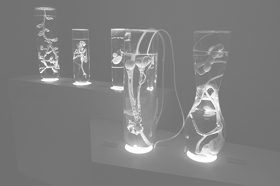Partner Exhibition: An Ecosystem of Excess
Partner Exhibition: An Ecosystem of Excess
Partner Exhibition at Project Space of Ernst Schering Foundation
Unter den Linden 32-34, 10117 Berlin
Opening: 23 January 2014, 19:00-21:00
Open daily: 24 January - 4 May 2014 11:00-18:00
Sylvie Earle, explorer and oceanographer, says Earth is a misnomer and the planet should be called the Ocean. Oceans are the life support system of the planet as well as its salty wombs. The ancient ocean, the primordial soup, gave birth to the very first organic molecules and was brimming with prehistoric living organisms. That was four billion years ago. Today the composition of oceans is undergoing a dramatic change where synthetic molecules are taking over. Anthropogenic waste has filled our oceans in less than two decades. A striking site in this respect is the Great Pacific Garbage Patch. Covering between 700 000 and 15 million km², the site is a monument to plastic waste on a global scale. Referring to Kantian aesthetics, it is a truly 'sublime' kinetic sculpture built by all the nations around the Pacific Ocean through many years of mindless, unsustainable consumption. As environmental activist and discoverer of the Trash Vortex Captain Charles Moore boldly claims, “the ocean has turned into a plastic soup.”
From primordial soup to plastic soup, An Ecosystem of Excess asks a very simple question: “If life started today in our plastic debris filled oceans, what kinds of life forms would emerge out of this contemporary primordial ooze?
The project introduces pelagic insects, marine reptilia, fish and birds endowed with organs to sense and metabolise plastics as a new Linnean order of post-human life forms, Inspired by the groundbreaking findings of new bacteria that burrows into pelagic plastics, An Ecosystem of Excess envisions life forms of greater complexity, life forms that can thrive in man-made extreme environments, life forms that can turn the toxic surplus of our capitalistic desire into eggs, vibrations and joy.
Starting from excessive anthropocentrism An Ecosystem of Excess reaches anthropo-de-centrism, by offering life without mankind.
Some works of this exhibition will also be shown at Haus der Kulturen der Welt.
This exhibition is a cooperation between transmediale and the Ernst Schering Foundation.

